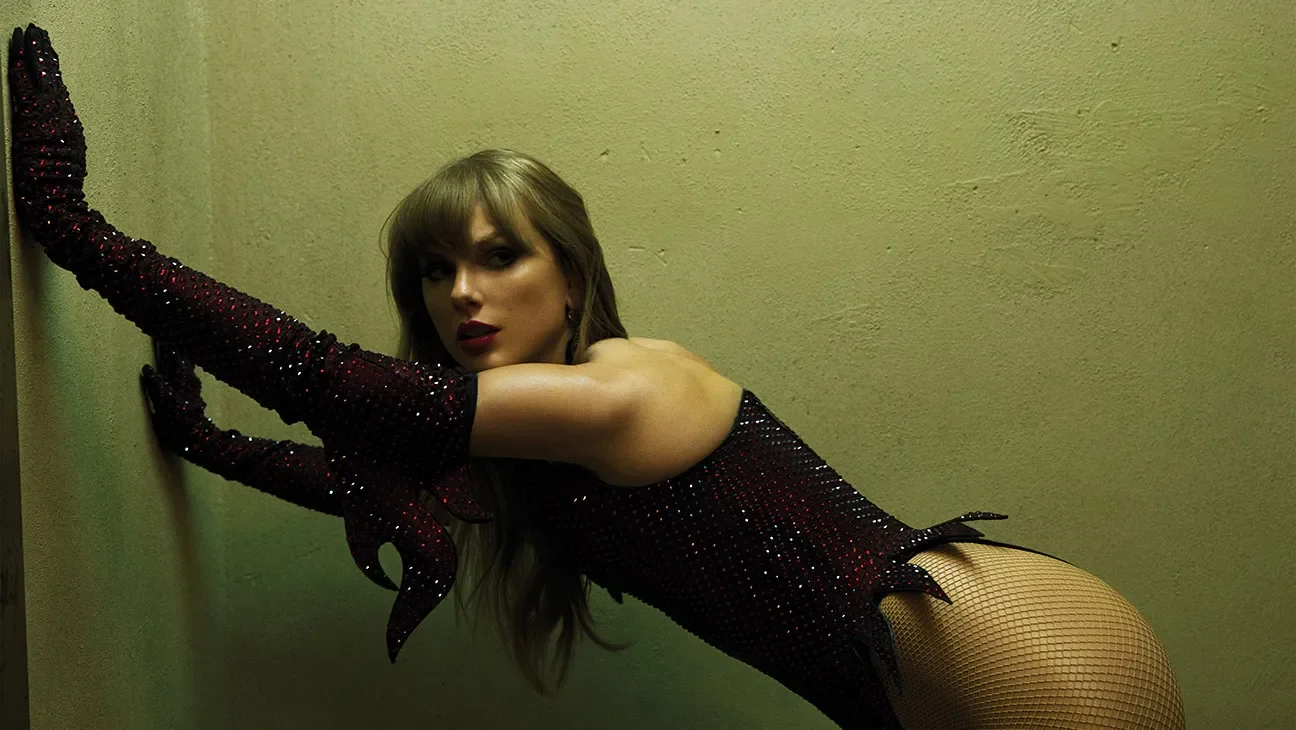THE LIFE OF A SHOWGIRL
Genre: Pop/R&B By: Taylor Swift Released: October 3, 2025 Label: Republic
The Life of a Perpetual Victim (Taylor’s Version)
🔥🪵🪵🪵🪵
Mert Alas & Marcus Piggott; Courtesy of TAS Management
And just like that, she’s back. But can one really return if they never left? If Taylor Swift could find a way to insert herself into every single one of your dreams, she would. For now, she’ll have to settle for flooding your airwaves with every minute detail of her life – and more variants than the COVID virus. Lest we forget, she remains a willing prisoner in the panopticon of her own making: every move surveilled, monetized, and mythologized.
The Life of a Showgirl inadvertently exposes how Taylor Alison Swift sees herself: as a perpetual victim. It’s her laziest project, both sonically and lyrically, but perhaps her most honest portrait yet.
Swift opens her twelfth studio album – yes, twelfth – with “The Fate of Ophelia,” a song loosely stitched together by vague references to Hamlet. Fitting, as she is our self-appointed English teacher. Once a proud, childless cat lady during the most recent election cycle, Swift spins a convoluted metaphor only to say that a burly man in a football uniform saved her from emotional ruin. Ophelia, a complex figure long interpreted as a casualty of patriarchal constraint, here becomes an allegory for the despair Swift has experienced in her overly exposed love life. She further misappropriates and cheapens the narrative by inexplicably weaving in the plot of Tangled – the overarching point being that she’s hopeless without a man:
All that time, I sat alone in my tower
You were just honing your powers
Now I can see it all
Late one night, you dug me out my grave
And saved my heart from the fate of Ophelia
"The Fate of Ophelia," Taylor Swift (2025)
Like a princess locked in a tower, she’s met her Prince Charming and can finally live her trad-wife fantasy – because liberalism, after all, is just an unmarried woman’s coping mechanism. She was a (white) feminist before, but now she’s affianced and can extinguish that torch. These days, she’s simply white – surrounding herself with the likes of MAGA fanatic Brittany Mahomes and torchbearers of another kind. It’s fine though; she actually “prefers [her] friends canceled and wrapped in Gucci,” as she boasts on the tenth track “CANCELLED!”: “At least you know exactly who your friends are/ they’re the ones with matching scars,” she sings.
Forget matching beaded bracelets – we’re matching wounds, perceived or otherwise. At the end of the day, class solidarity trumps morality.
It’s a billionaire’s club, baby, and you’re not in it!
Instead of reflecting on her transgressions, Swift shames critics for daring to call out her harmful behavior. She deflects personal responsibility by flashing her (white) feminist card when the protection her Amex affords her is no longer convenient. “Did you make a joke only a man could? / Were you too smug for your own good?” With this lyric, Swift collapses the distinction between accountability and misogyny – manipulating the narrative so that legitimate criticism reads as gendered persecution.
Furthermore, Taylor Swift operates under the impression that anyone who stands by her before she’s exonerated in the court of public opinion is deserving of lifelong loyalty – regardless of how they’ve treated others. She’s the type to say, “Well, they were always nice to me,” after you’ve confided that someone has hurt you. And yet, we’re expected to rush to her defense even when she fudges the truth about the ownership of her masters, demands writing credits on her younger protégé's quasi-inspired hit single, or floods the market with endless variants to edge other women off the top of the Billboard Hot 100 – as if she hasn’t siphoned enough unearned money from her fans already.
Swift presents herself as a damsel in distress when, in reality, she is more akin to the Father Figure she depicts on track four of the same name. The track is allegedly her imagining of a role reversal between a powerful man and his son; however, it unwittingly mirrors her own evolution from a naive blue-eyed, blonde, thin white woman into one of the most relentless business moguls in the industry. She even says it better herself, for once:
All I asked for is your loyalty, my dear protégé
I’ll be your father figure
I drink that brown liquor
I can make deals with the devil
Because my dick’s bigger
"Father Figure," Taylor Swift. (2025)
And there you have it.
To add insult to injury, Swift dunks on the poors (again) by belittling the aspirations of those living paycheck to paycheck and struggling under systemic oppression on “Wi$h Li$t”. Now that she’s been proposed to – in a totally organic way that just happened to occur weeks before the album release – she can finally invalidate childless cat ladies and people who “want those three dogs that they call their kids.” All Taylor Swift wants is Travis Kelce, two (human) kids, and a basketball hoop in the driveway – preferably in a gated community where the whole block looks like Travis. This could be a dog whistle given the conservative undertones throughout the album, but it’s hard to say for sure. Oh, and most importantly, she wants the world to “leave [them] the fuck alone.”
We’re trying, but she won’t let us. Taylor Swift is off-limits, but everyone else is fair game. That’s not just hypocrisy – it’s the business model.
Apparently, Capitalist Barbie doesn’t take kindly to being called “Boring Barbie” by a coked-out Charli xcx. Her words. “Actually Romantic” is a supposed diss track aimed at the inventor of all things brat – one of several albums Swift tried to suffocate with her bloated opus, The Tortured Poets Department, just last year. We can’t catch a break. Even the title is a play on words, a nod to Charli's popular song “Everything is romantic” – though Swift's track is reportedly a response to “Sympathy is a knife.”
Naturally, Taylor Swift took offense to Charli’s introspective track, which unpacked her own insecurity in the presence of pop’s biggest name backstage at her boyfriend's show. For context, Charli’s now-husband, George, and Swift's ex-boyfriend, Matty Healy, were bandmates at the time. Rather than study the track and learn a thing or two about writing with self-awareness – and a touch of humility – Swift fired back at a non-issue with a lyrically inept tantrum. Hey, Siri: define “narcissistic injury.”
And I know you think it comes off vicious
But it’s precious, adorable
Like a toy chihuahua barking at me from a tiny purse
That’s how much it hurts
"Actually Romantic," Taylor Swift. (2025)
It wouldn’t be a Taylor Swift song without her thinking something is about her when it really couldn’t be further from the truth (hello, every award show ever). Perhaps more perplexing than her complete inability to get the point is that she gets arguably the most horned up thinking about the perceived hate directed at her. Please – not another Reputation moment. More than an entire track dedicated to her fiancé’s… ahem, appendage, she’s really revved up. She openly admits to getting off on playing the victim. Not sure that was the intent.
You think I’m tacky, baby
Stop talking dirty to me
It sounded nasty,
But it feels like you’re flirting with me
I mind my business,
God’s my witness
I don’t provoke it
It’s kind of making me wet
"Actually Romantic," Taylor Swift. (2025)
Also not sure what it says when a diss track exudes more sexual tension than a two-and-a-half-minute ode to Travis Kelce’s “Wood.” It’s an odd amalgamation of children’s rhymes and superstitions, perhaps attempting to explain…what exactly The Jackson 5’s “I Want You Back” has to do with this Travisty. Something like: “ABC as easy as 123” parallels “Stepped on a crack and the black cat laughed”? This might be more thought than even she put into it.
The album, as a whole, is riddled with samples – and instrumentation lifted from better songs, most obviously Post Malone’s “Circles” and Pixies’ “Where is my Mind?”. There’s not an ounce of evolution since her so-called magnum opus (The Tortured Poets Department and The Anthology), largely because she put no time into conceptualizing the album. Apparently, she doesn’t need to. Her cult-like fan base will seemingly accept anything she doles out in batches, from one countdown to the next. Oh, how she loves a countdown.
She couldn’t just let The Eras Tour come and go without milking it for every cent and every last drop of relevance. Thus, The Life of a Showgirl was born: an album she allegedly wrote while on tour about how hard it is to be a billionaire… or, uh, a showgirl. Is the showgirl in the room with us? She borrowed the aesthetic but failed to channel any of its energy. It could have been a fascinating concept album – if she were willing, or able, to step outside of herself for a moment.
But that’s the problem isn’t it? Overexposure – and incessant glazing by practically everyone in Hollywood desperate to avoid vitriol from the Swifties (and, let’s be honest, from Taylor herself) – has completely stunted her artistic growth. She doesn’t have to be remarkable when the name alone does the heavy lifting. Taylor Swift, the business entity, doesn't make music out of love for the craft or process; she makes it for the attention (and the money) it affords her. If she genuinely cared, she’d funnel some of those abundant resources into refining her vocals, visuals, and musicianship. But alas, there is no incentive to improve when the current treatment works.
We wouldn’t accept this from anybody else. So why her?
The good news? You've made it to the end. The bad news? We’re staring down the barrel of album thirteen. Her favorite number. Her supposed Tour de Force. You think she’s inescapable now? Judging by the reception of this release, Reputation 2.0 feels inevitable. Unless, of course, she shocks us all and gives us a break.

